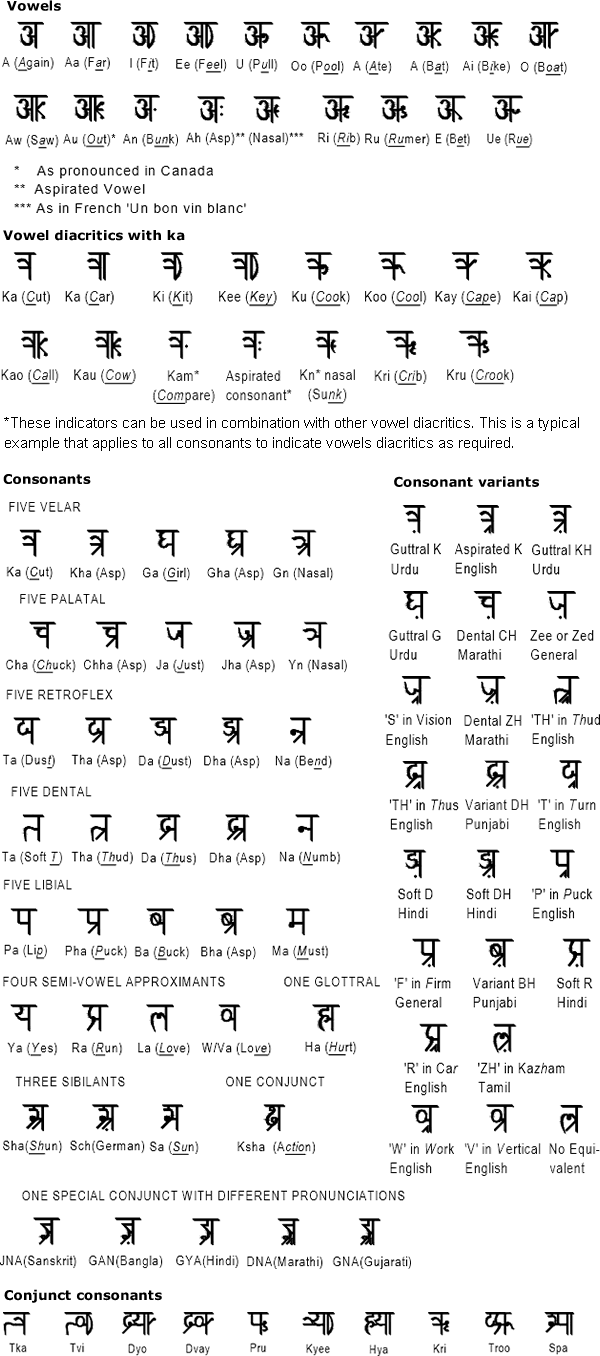Noot-Nagari is an expanded version of the Devanagari script devised by Arvind V. Garde that could be used to write all the languages of India. The name is an abbreviation for Nutan Devanagari (New Devanagari).
Noot-Nagari is modified to eliminate inconsistencies that have crept into Devanagari and variations in pronunciations of some vowels and consonants in Hindi and Marathi, two of the languages written in Devanagari script. To ensure that it is suitable for adoption by all the languages of India, Noot-Nagari is conceived with the capability to incorporate additional letters when the need arises.
Currently India has almost a dozen types of alphabets that are used in different parts of the country. Devanagari, the script of Sanskrit language, is also used by Hindi, India's national and most widely-spoken language, along with Marathi and a number of other languages. Languages such as Assamese, Bengali, Gujarati, Kannada, Malayalam, Punjabi, Odia, Tamil and Telugu use distinctly different alphabets.
If the country adopts one script then it would make learning any other Indian language much easier, because it would not entail learning another type of alphabet. Though it is a stretch, one could say that it would also serve as a unifying factor. Come to think of it, English seems to br the only thing that is common to all India, though it is limited only to well-educated persons. That is the reason that this document is written in English.

Consonant variations provide Noot-Nagari the capability to express the slight differences in the way consonants are pronounced in a particular language or in different languages. This is primarily due to words used or borrowed from other languages, as well as variations in pronunciations if not specifically identified, require knowledge of that language to pronounce the word correctly.
As explained earlier, Hindi uses a dot or period to identify the variant pronunciation to clarify the proper pronunciation, whereas Marathi does not. Therefore, the knowledge of the language becomes necessary to know the correct pronunciation. For example, वाचा (speech) and वाचा (read) are written exactly the same way, but is not pronounced the same way, and the meaning of the word changes completely depending upon how it's pronounced. Noot-Nagari identifies such differences, so it will not be necessary to know either the language or the context for pronouncing the consonant correctly.
There may be additional variations in other Indian languages that have not been included in this list. So depending on the needs of the different languages additional consonants and/or consonant variations may be added to the above list. Noot-Nagari is designed with the capability to expand as and when the need arises or is identified.
This consonant variant with no English equivalent is used in Sanskrit and some four or so languages, Gujarati, Kannada, Rajasthani (Marwari) and Marathi. It could possibly have been included in the list of consonants.

सभी मनुष्यों को गौरव और अधिकारों के मामले में जन्मजात स्वतन्त्रता और समानता प्राप्त है। उन्हें बुद्धि और अन्तरात्मा की देन प्राप्त है और परस्पर उन्हें भाईचारे के भाव से बर्ताव करना चाहिए।
Sabhī manuṣyōṁ kō gaurava aura adhikārōṁ kē māmalē mēṁ janmajāta svatantratā aura samānatā prāpta hai. Unhēṁ bud'dhi aura antarātmā kī dēna prāpta hai aura paraspara unhēṁ bhā'īcārē kē bhāva sē bartāva karanā cāhi'ē.
All human beings are born free and equal in dignity and rights. They are endowed with reason and conscience and should act towards one another in a spirit of brotherhood.
(Article 1 of the Universal Declaration of Human Rights)
Download a PDF with more detailed information about Noot-Nagari
Constructed scripts for: Ainu | Arabic | Chinese languages | Dutch | English | Hawaiian | Hungarian | Japanese | Korean | Lingala | Malay & Indonesian | Persian | Tagalog / Filipino | Russian | Sanskrit | Spanish | Taino | Turkish | Vietnamese | Welsh | Other natural languages | Colour-based scripts | Tactile scripts | Phonetic/universal scripts | Constructed scripts for constructed languages | Adaptations of existing alphabets | Fictional alphabets | Magical alphabets | A-Z index | How to submit a constructed script
[top]
You can support this site by Buying Me A Coffee, and if you like what you see on this page, you can use the buttons below to share it with people you know.

If you like this site and find it useful, you can support it by making a donation via PayPal or Patreon, or by contributing in other ways. Omniglot is how I make my living.
Note: all links on this site to Amazon.com, Amazon.co.uk
and Amazon.fr
are affiliate links. This means I earn a commission if you click on any of them and buy something. So by clicking on these links you can help to support this site.
[top]